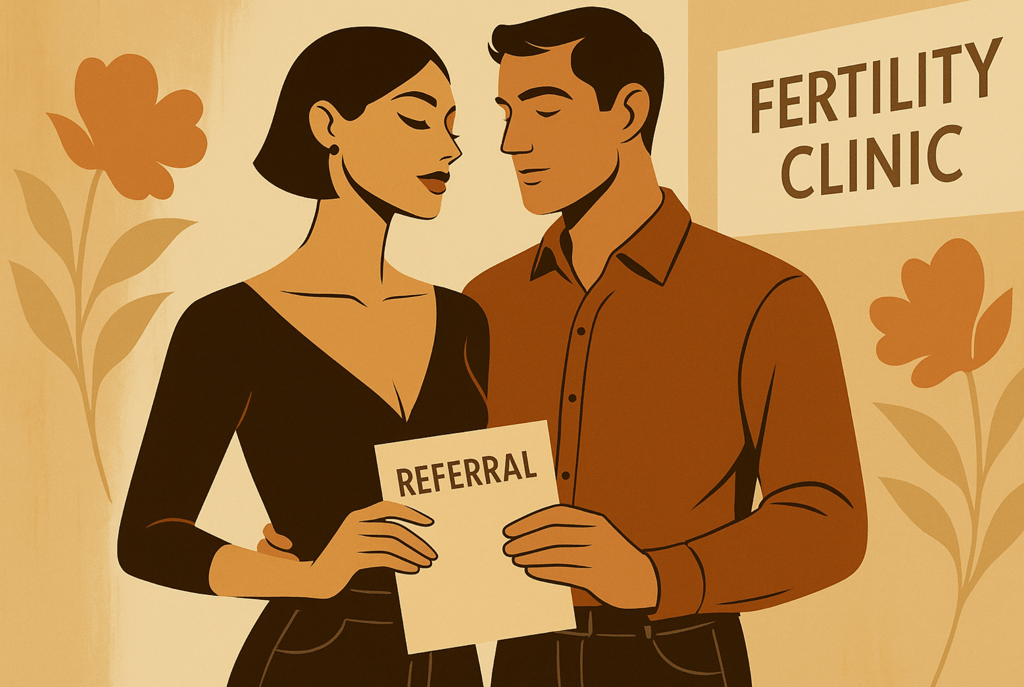Is It Time to Get Help? Recognising the Signs of Infertility
Struggling to conceive? Learn when to seek fertility help, early signs to watch for, and how the NHS supports infertility in the UK. Learn signs of infertility.
GETTING STARTED


For many of us, the idea of having children one day feels like a given — something that will simply happen, when the time is right. Infertility is often seen as something that happens to other people. Until it doesn’t.
As the months go by and nothing changes, a quiet worry starts to settle in. You might find yourself googling symptoms, tracking your cycle more obsessively, or wondering, Should I be concerned? Is this delay normal?
This post gently walks you through those questions, offering UK-specific advice, emotional validation, and practical steps for moving forward — whether you're just starting to worry, or already feel ready to act.
What’s Considered “Normal” Fertility Timing in the UK?
According to NHS guidance, most heterosexual couples will conceive within a year if they’re having regular, unprotected sex (every 2–3 days throughout the month). Statistically:
80% will conceive within 12 months
90% will conceive within 2 years
If you’ve been trying for over a year without success — or over six months if you’re over 35 — it’s time to speak to your GP.
🩺 Already have a diagnosis like PCOS or endometriosis, or suspect male fertility issues? You don’t need to wait. You’re entitled to ask for support right away.
Signs That It Might Be Time to See a Doctor
Fertility issues affect people of all backgrounds and body types. Some have clear symptoms. Others just have a quiet gut instinct that something’s off.
For those with ovaries:
Irregular periods, or periods that have stopped
Severe pain with menstruation or during sex
Diagnosed conditions like PCOS or endometriosis
A history of multiple miscarriages
For those with sperm:
Issues with ejaculation, libido, or erection
A history of testicular surgery, injury, or infection
Past chemotherapy, vasectomy, or undescended testicles
Never having caused a pregnancy before
Even if none of these apply, it’s okay to ask for help. You know your body better than anyone. Trust yourself.
What Happens at a GP Appointment for Fertility?
Your GP is your starting point. At your first appointment, they’ll likely ask about:
Your cycle, lifestyle, and general medical history
Any relevant symptoms or conditions
How long you’ve been trying, and how often you're having sex
Initial tests may include:
Hormone blood tests (typically day 2–5 and day 21 of your cycle)
Semen analysis (for male partners)
Pelvic exam or STI screening if needed
Depending on the results, your GP might:
Offer reassurance if you’re still within the “normal” window
Refer you to a fertility clinic for further testing
Talk through NHS eligibility criteria, which can vary by region
🔍 Tip: NHS fertility policies are managed by your area's Integrated Care Board (ICB). Most follow NICE guidelines, but local rules around things like BMI, smoking status, or existing children can still affect access.
What to Know About NHS Fertility Treatment
Under NICE guidelines, if you’re under 40 and meet the criteria, you may be eligible for:
Up to 3 cycles of IVF after 2 years of trying
Or after 12 failed inseminations for same-sex or solo parents
If you’re aged 40–42, you may be eligible for 1 cycle of IVF, depending on test results and medical history.
But availability varies. Some NHS trusts limit treatment based on:
BMI thresholds
Smoking status
Whether you already have children
📖 Read More: NHS vs Private Fertility Treatment — What’s the Difference?
The Emotional Weight of Waiting
Waiting is often the hardest part of this journey. You might feel:
Ashamed to ask for help “too early”
Jealous of others — and then guilty
Alone, even if you’re not technically alone
Confused about what’s considered “normal”
These feelings are real, valid, and so common. And asking for help doesn’t make you dramatic or impatient — it makes you brave.
📖 Read More: Coping with the Emotional Side of Trying to Conceive
When You Should Push for Answers
You don’t need to wait for a full year if:
You’re 35+ and have been trying for 6+ months
Your periods are irregular or absent
You’ve had two or more miscarriages
You’ve been diagnosed with a condition that affects fertility
You just know something isn’t right
Your concerns deserve to be taken seriously. Keep advocating for yourself.
LGBTQ+ and Solo Parents: Your Journey Counts Too
If you’re part of an LGBTQ+ couple or planning to conceive solo, the timeline might look different — but your path is equally valid.
Unfortunately, NHS access often requires 6–12 rounds of self-funded IUI before IVF becomes available. This varies across regions and is under ongoing scrutiny and legal challenge.
📖 Read More: LGBTQ+ Fertility Treatment in the UK
There’s No “Too Soon”
If you’re wondering whether this delay is normal — that’s your sign.
You don’t have to wait until things feel really wrong to ask for support. Trust your timing. Trust your instincts.
📖 Explore more:
© 2025. All rights reserved.
